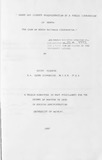| dc.description.abstract | This thesis investigates the problems inherent in the landlord
and tenant relationship that arise once land has been leased or a
licence issued. It focuses on public administration of land
because large tracts of land in Kenya, especially in the urban
areas, are held on public leaseholds. To maximise the benefits of
the leasehold system, it is necessary that the leases and
licenses are administered to their best advantage.
The administration of land through the use of leases and
licenses allows a landlord to retain control of his land even as
he gives up physical possession. The terms and conditions of the
lease and license agreements are used by the landlord to maintain
this control during the term of the lease or license. Problems
arise when the landlord or tenant breach the terms or conditions
of the lease or license.
This thesis investigates the causes of the breaches of the
lease and license agreement, with the Kenya Railways Corporation
with the case study. It begins by examining the institutional
arrangements for lease administration as provided for by the
Corporation with the aim of assessing their adequacy. The study
then proceeds to examine the,clauses of the agreements most
commonly breached and the remedial action taken. To provide
an alternate view point the tenants were also interviewed.
The study is divided into five chapters. The first chapter
comprises the introductory section covering the problem
statement, the study hypothesis, the study objectives, the scope
of the study and research methodology. The second chapter
reviews literature on leases and licences, and their
administration by public institutions in general. Chapter three
discuss the historical development of the Kenya Railways
Corporation real estate and the type of leases and licenses
administered. The study findings are recorded in Chapter Four.
The study found that the problems arising during lease and
licence administration are not caused entirely by the Estate
Manager. Insufficient staff, inadequate equipment and transport
facilities have contributed to inefficiency, poor record keeping
and min~mum supervision. Confusion arising from two departments
demanding and collecting rents has resulted in rental arrears.
The Estate Manager was also not always able to execute remedial
action as this was left to other Departments, for instance
physically evicting troublesome tenants or pursuing legal
redress. As a result tenants did not take seriously threats of
remedial action.
Finally in chapter five the study conclusions
and recommendations are given. It is recommended that the
institutional set up for land administration by the Kenya
Railways Corporation be reconstructed with the department
becoming fully operational. It further recommends stronger,
clearly defined inter-departmental linkages between all the
departments dealing with land. | en |

